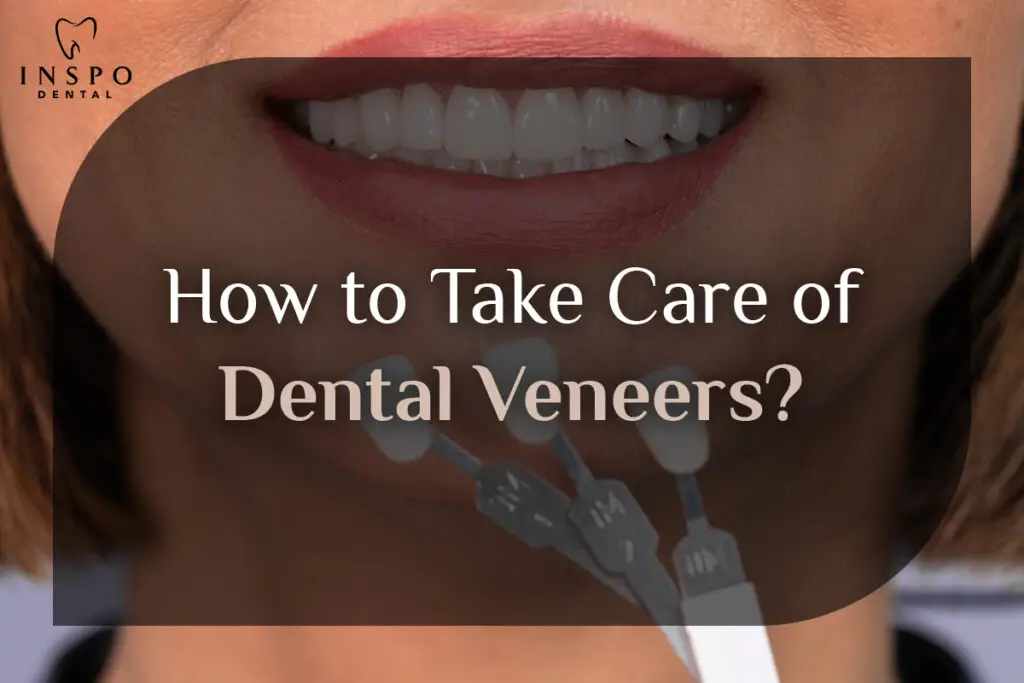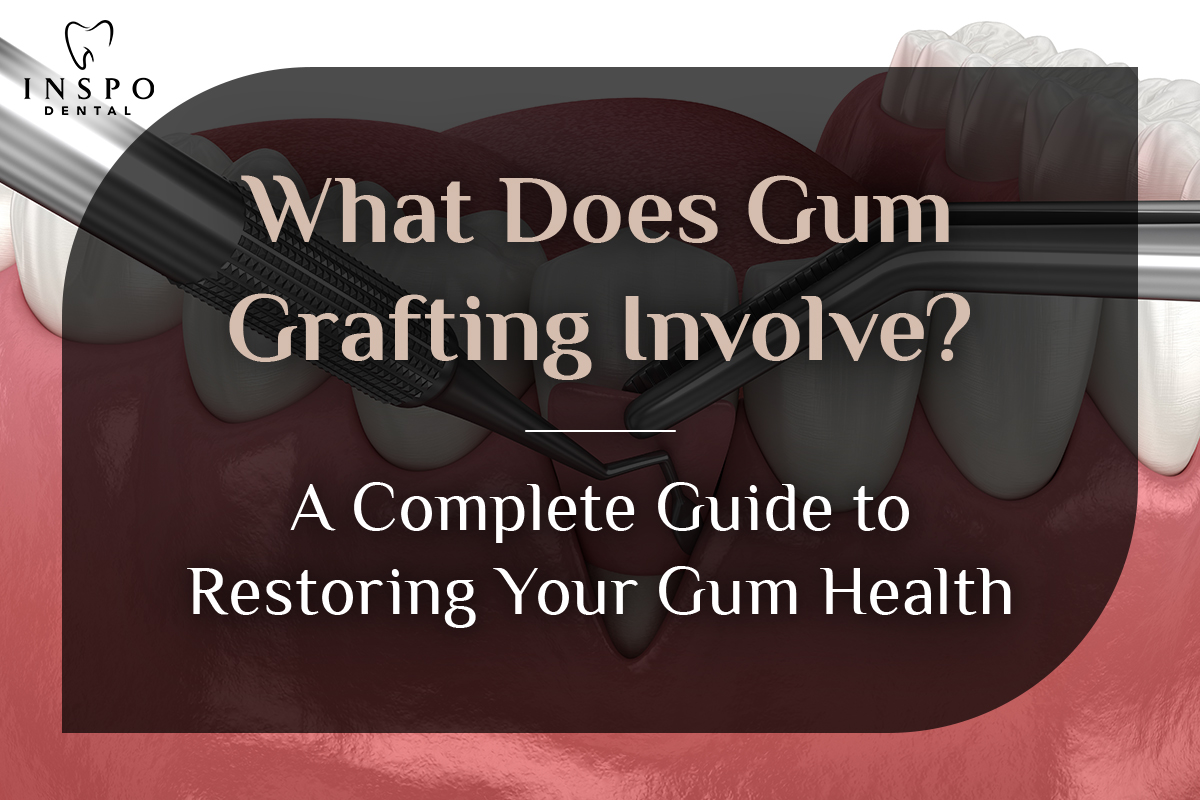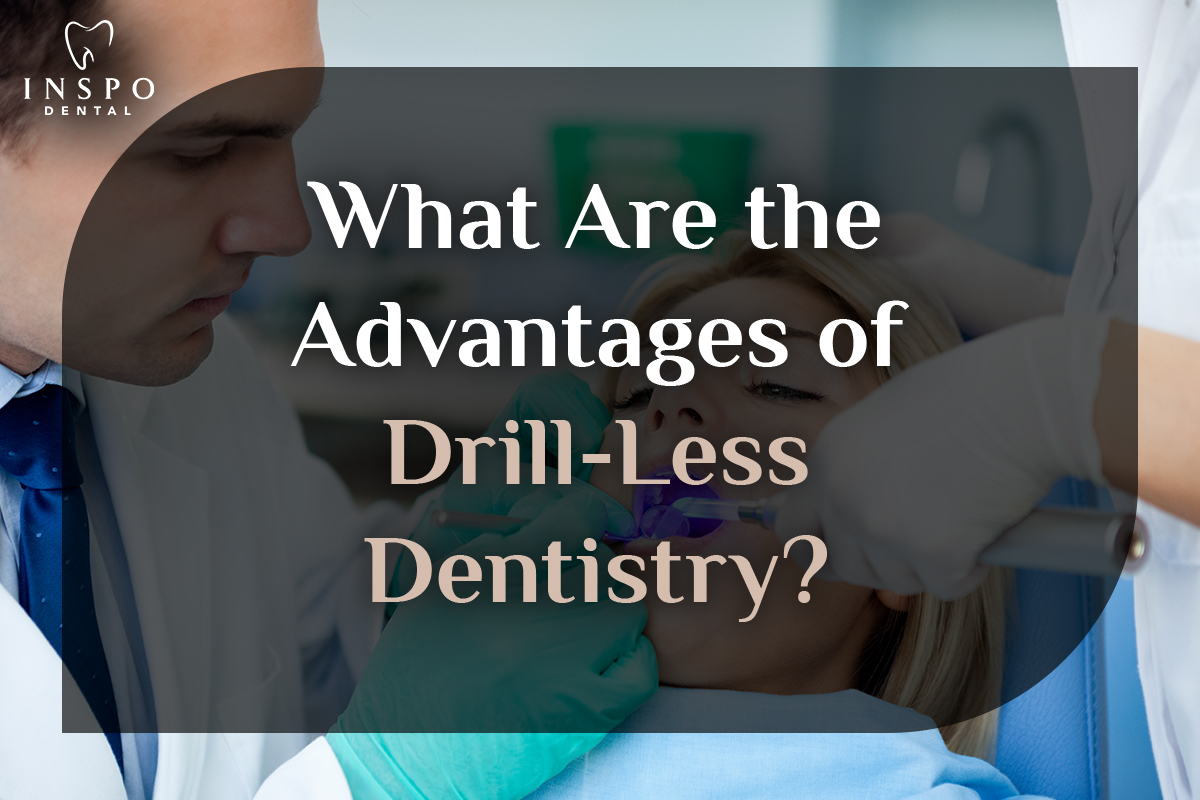Dental veneers are a popular and effective way to enhance your smile, offering a natural appearance and durability. Proper care is essential to maintain their appearance and ensure they last for years. Here’s a comprehensive guide on how to take care of your dental veneers:
- Maintain Good Oral Hygiene
Veneers require the same level of care as your natural teeth to keep them clean and healthy.
- Brush Twice Daily:
- Use a soft-bristled toothbrush and non-abrasive fluoride toothpaste to prevent scratching the veneer surface.
- Floss Daily:
- Use floss or interdental brushes to clean between your teeth and along the gumline to prevent plaque buildup.
- Rinse with Mouthwash:
- Use an alcohol-free antibacterial mouthwash to maintain gum health without risking adhesive weakening.
- Avoid Hard or Sticky Foods
Although veneers are durable, certain foods and habits can damage them over time.
- What to Avoid:
- Hard foods like ice, nuts, or candies that can chip or crack veneers.
- Sticky foods like caramel or taffy that may pull at the veneer edges.
- Chew Carefully:
- Avoid using your teeth to open packages or bite into hard objects.
- Minimize Stain Risks
Veneers are resistant to staining, but the natural teeth around them can still stain, creating an uneven appearance.
- Avoid Staining Foods and Drinks:
- Limit coffee, tea, red wine, and dark-colored sauces.
- Quit Smoking:
- Smoking can discolor the edges of your veneers and harm your overall oral health.
- Brush After Staining Foods:
- If you consume staining foods or drinks, brush your teeth or rinse your mouth with water immediately afterward.
- Protect Against Wear and Tear
Veneers are strong, but certain habits can reduce their lifespan.
- Avoid Teeth Grinding (Bruxism):
- If you grind your teeth, ask your dentist about a custom mouthguard to protect your veneers.
- Wear a Nightguard:
- Use a nightguard if you tend to clench your teeth during sleep.
- Use a Mouthguard During Sports:
- Protect your veneers with a sports mouthguard during high-contact activities.
- Schedule Regular Dental Checkups
Routine dental visits are crucial to monitor the health of your veneers and natural teeth.
- Professional Cleanings:
- Regular cleanings remove plaque and tartar that can affect the margins of your veneers.
- Monitor Veneer Condition:
- Your dentist can check for chips, cracks, or wear and recommend repairs or replacements if necessary.
- Address Issues Promptly
Any problems with your veneers should be addressed immediately to prevent further damage.
- Signs to Watch For:
- Sensitivity or discomfort
- Loose veneers
- Visible chips or cracks
- What to Do:
- Contact your dentist if you notice any issues. Avoid attempting DIY fixes, which can worsen the problem.
- Maintain a Healthy Diet
A balanced diet supports overall oral health and prolongs the life of your veneers.
- Foods to Include:
- Crunchy fruits and vegetables like apples and carrots, which promote saliva production and help clean teeth.
- Dairy products like milk and cheese for strong teeth and healthy gums.
- Foods rich in calcium and vitamin D to support your natural teeth and gums.
- Be Gentle with Your Veneers
While veneers are durable, they require mindful care to prevent unnecessary strain.
- Use the Right Tools:
- Avoid biting your nails or chewing on pens and pencils.
- Cut tough foods, like steak or crusty bread, into smaller pieces to reduce stress on your veneers.
- Choose the Right Dental Products
The products you use can impact the longevity and appearance of your veneers.
- Non-Abrasive Toothpaste:
- Choose toothpaste designed for veneers or one labeled “non-abrasive” to avoid dulling their shine.
- Soft-Bristled Toothbrush:
- Avoid hard-bristled brushes, which can cause scratches.
- Follow Your Dentist’s Instructions
Your dentist may provide personalized care instructions tailored to your specific veneers.
- Post-Procedure Tips:
- After veneer placement, follow any guidelines for eating, brushing, or using mouthwash.
- Long-Term Maintenance:
- Ask about polishing options or professional touch-ups to keep your veneers looking like new.
What to Avoid
- Over-the-Counter Whitening Products:
- These can damage veneers and create an uneven appearance between natural teeth and veneers.
- Skipping Dental Visits:
- Missing routine checkups can lead to plaque buildup or unnoticed damage.
- Using Teeth as Tools:
- Avoid using your teeth to open bottles, packages, or other items.
- Consider Veneer Polishing
- Why It Matters:
- Veneers can lose their natural shine over time due to plaque buildup or exposure to acidic foods.
- How to Do It:
- Schedule professional polishing with your dentist, who will use special tools and materials designed for veneers.
- Avoid at-home polishing kits, which may scratch or dull the surface.
- Monitor Changes in Your Bite
- Why It Matters:
- Veneers may shift slightly over time or feel different if your bite changes due to grinding or dental work.
- What to Do:
- Inform your dentist if you notice uneven pressure, clicking, or discomfort while chewing.
- Regular adjustments can prevent unnecessary wear or cracking.
- Protect Against Acidic Erosion
- Why It Matters:
- Acids from citrus fruits, vinegar, or soda can weaken the bond between your veneers and natural teeth.
- How to Do It:
- Limit acidic foods and drinks, or rinse your mouth with water immediately after consuming them.
- Use fluoride rinses or remineralizing toothpaste to strengthen the enamel supporting your veneers.
- Address Gum Health
- Why It Matters:
- Healthy gums are essential for supporting veneers. Gum recession can expose the edges of veneers, compromising their aesthetics and stability.
- How to Do It:
- Brush gently along the gumline to prevent irritation or recession.
- Use an interdental brush or water flosser to clean hard-to-reach areas without harming the gums.
- Use Custom Nightguards
- Why It Matters:
- If you clench or grind your teeth at night, this can put stress on your veneers, leading to cracks or wear.
- How to Do It:
- Ask your dentist to create a custom-fit nightguard that protects your veneers while you sleep.
- Avoid over-the-counter guards, which may not fit properly and could shift veneers.
- Be Mindful of Temperature Sensitivity
- Why It Matters:
- After placement, veneers may feel sensitive to hot or cold foods due to changes in the enamel.
- How to Do It:
- Use desensitizing toothpaste to manage mild discomfort.
- Gradually reintroduce very hot or cold foods if sensitivity persists.
- Limit Alcohol Consumption
- Why It Matters:
- Excessive alcohol can weaken the bonding material holding your veneers in place.
- What to Do:
- Minimize alcohol intake, particularly in mouthwashes or drinks.
- Opt for alcohol-free oral care products.
- Educate Yourself on Long-Term Replacement
- Why It Matters:
- Even with the best care, veneers may need replacement after a decade or more due to natural wear.
- What to Do:
- Plan for replacement by discussing timelines and costs with your dentist.
- Maintain detailed records of veneer placement and any repairs to ensure continuity of care.
- Invest in High-Quality Dental Care Products
- Why It Matters:
- Not all dental products are safe for veneers, and choosing the right ones can prolong their lifespan.
- What to Use:
- Soft, ultrasonic electric toothbrushes for gentle cleaning.
- Toothpaste specifically formulated for veneers or sensitive teeth.
- Dental floss designed to glide smoothly without fraying or sticking.
- Address Bruxism and Stress-Related Habits
- Why It Matters:
- Stress-induced grinding or clenching is a major cause of veneer damage.
- How to Do It:
- Practice stress-reduction techniques like yoga or meditation.
- Consult your dentist about additional protective measures if bruxism persists.
- Avoid Whitening Treatments on Natural Teeth Near Veneers
- Why It Matters:
- Veneers do not whiten, so whitening natural teeth can create a mismatch in color.
- How to Do It:
- Maintain the shade of your natural teeth to match your veneers.
- Discuss professional veneer-compatible whitening options with your dentist.
- Stay Consistent with Follow-Up Appointments
- Why It Matters:
- Routine dental visits ensure your veneers and natural teeth are monitored for any issues.
- How to Do It:
- Schedule bi-annual cleanings and exams.
- Ensure your dentist inspects the edges of your veneers for wear or looseness.
- Plan for Special Events Carefully
- Why It Matters:
- Veneers are a cosmetic investment, and maintaining their appearance is essential for special occasions like weddings or public speaking events.
- What to Do:
- Consider professional cleaning or polishing before important events.
- Use touch-up products recommended by your dentist to enhance the veneers’ luster.
- Understand the Limits of Veneers
- Why It Matters:
- Veneers are strong but not indestructible, and understanding their limits can help you avoid damage.
- What to Avoid:
- Using veneers for non-food purposes (e.g., opening packages).
- Biting directly into extremely hard or tough foods like ribs or hard candy.
- Be Proactive with Veneer Repairs
- Why It Matters:
- Minor chips or cracks can worsen if not addressed promptly.
- How to Do It:
- Contact your dentist immediately if you notice damage.
- Repair techniques like bonding or polishing can restore veneers without requiring full replacement.
- Address Changes in Your Oral Health
- Why It Matters: As you age, your oral health changes, which can affect your veneers and surrounding teeth.
- What to Do:
- Monitor for gum recession or sensitivity, as these can expose veneer edges and compromise their look or function.
- Maintain strong oral hygiene practices to support the gums and prevent issues like periodontitis.
- Consider Professional Whitening for Surrounding Teeth
- Why It Matters: While veneers themselves don’t stain, natural teeth around them may discolor over time, creating an uneven appearance.
- What to Do:
- Consult your dentist about professional whitening treatments for your natural teeth before placing veneers.
- Use whitening toothpaste approved for veneers to maintain the brightness of surrounding teeth.
- Explore Veneer-Specific Maintenance Treatments
- Why It Matters: Some dental clinics offer specialized veneer maintenance services that keep them looking fresh and polished.
- What to Do:
- Ask your dentist about veneer-specific cleaning, polishing, or sealing treatments to prolong their lifespan.
- Understand the Effects of Aging on Veneers
- Why It Matters: Your natural teeth and gums will age, potentially affecting the fit and appearance of your veneers.
- What to Do:
- Regularly evaluate the fit of your veneers with your dentist.
- Plan for potential replacement if gum recession, wear, or discoloration impacts their aesthetics.
- Protect Veneers from Environmental Factors
- Why It Matters: Environmental factors like sun exposure or harsh climates can impact oral health indirectly.
- What to Do:
- Stay hydrated to maintain adequate saliva production, which protects teeth and veneers from bacteria.
- Use lip balm with SPF to protect the lips and surrounding tissues from sun damage.
- Prevent Plaque Buildup Around Veneers
- Why It Matters: Plaque can accumulate near the edges of veneers, especially at the gumline, leading to decay or gum inflammation.
- What to Do:
- Use a water flosser to gently clean around the edges of veneers.
- Incorporate plaque-reducing mouthwashes into your routine.
- Monitor Diet for Veneer Longevity
- Why It Matters: Acidic, sugary, or sticky foods can affect the adhesive and surrounding teeth, leading to veneer failure.
- What to Do:
- Limit foods like citrus fruits, carbonated drinks, and candy.
- Opt for foods that promote oral health, such as fiber-rich vegetables and calcium-rich dairy products.
- Be Mindful of Stress-Induced Habits
- Why It Matters: Stress can lead to habits like clenching or grinding, which put undue pressure on veneers.
- What to Do:
- Identify and manage stress triggers through relaxation techniques, exercise, or therapy.
- Wear a mouthguard during stressful times if grinding worsens.
- Avoid Aggressive Brushing
- Why It Matters: Brushing too hard can erode natural teeth near veneers and damage the veneer surface.
- What to Do:
- Use gentle, circular motions with a soft-bristled toothbrush.
- Replace your toothbrush every three months or sooner if the bristles fray.
- Learn About Emergency Veneer Care
- Why It Matters: Accidents can happen, and knowing what to do can prevent further damage.
- What to Do:
- If a veneer chips or falls off, save the piece if possible and contact your dentist immediately.
- Avoid chewing on the affected side and use dental wax to protect sharp edges temporarily.
- Keep Track of Your Veneer Warranty
- Why It Matters: Many dental practices or manufacturers offer warranties for veneers, which can cover repairs or replacements.
- What to Do:
- Store your warranty information in a safe place.
- Verify coverage details, such as time limits or conditions that may void the warranty.
- Recognize When Replacement Is Necessary
- Why It Matters: Even the best veneers may eventually need replacement due to wear or changes in oral structure.
- Signs to Watch For:
- Discoloration at the edges of veneers.
- Loose or shifting veneers.
- Visible cracks or chips.
- Consider Alternative Options When Replacing Veneers
- Why It Matters: Advances in dental technology may offer new solutions or materials for veneer replacement.
- What to Do:
- Discuss options like thinner veneers or new ceramic materials with your dentist.
- Evaluate if additional cosmetic treatments, such as reshaping or whitening, are needed.
- Communicate Lifestyle Changes to Your Dentist
- Why It Matters: Significant lifestyle changes, such as diet adjustments or increased physical activity, can impact oral health and veneer care.
- What to Do:
- Inform your dentist about changes like new sports activities (which may require mouthguards) or dietary habits.
- Adjust your care routine to accommodate these changes.
- Regularly Educate Yourself About Veneer Care Innovations
- Why It Matters: Dental care practices and technology evolve, providing better tools and techniques to maintain veneers.
- What to Do:
- Stay updated on new products, such as veneer-safe toothpastes or cleaning tools.
- Ask your dentist about the latest advancements in veneer care.
- Avoid DIY Dental Treatments
- Why It Matters: At-home whitening kits, adhesives, or repairs can harm your veneers and surrounding teeth.
- What to Do:
- Always consult your dentist for any issues or adjustments.
- Use only dentist-approved products for veneer maintenance.
- Invest in Veneer-Friendly Insurance Plans
- Why It Matters: Veneer-related dental work can be expensive, and some insurance plans may help cover costs.
- What to Do:
- Research dental insurance plans that include coverage for cosmetic dentistry.
- Consider savings plans or financing options for future veneer replacements.
Final Takeaways
- Caring for veneers requires consistent effort, including excellent oral hygiene, avoiding harmful habits, and regular dental visits.
- Staying proactive about maintenance, diet, and protection ensures your veneers remain aesthetically pleasing and functional for years.
- Open communication with your dentist is crucial to addressing issues promptly and exploring the best options for long-term care.
By integrating these tips into your routine, you can enjoy a beautiful, long-lasting smile while preserving the health of your natural teeth and gums.






